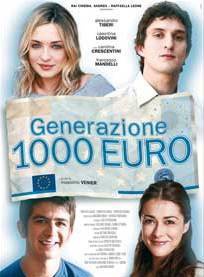The Italian Cultural week continued on Monday, October 20 with the display of a movie entitled ‘Generazione Mille Euro’ at Goethe Institute at Cantonments, Accra.
‘Generazione Mille Euro’ which means 1,000 Euro Generation was released in 2009 and directed by Massimo Venier with English subtitles.
Based on the eponymous novel by Antonio Incorvaia and Alessandro Rimassa (which began as a hit online blog), ‘The 1000-Euro Generation’ is a comedy about life’s many choices - personal and professional, financial and ethical played out by likable characters that warmly mix ingenuity and optimism.
The movie included vibrant and talented casts like Alessandro Tiberi who played Matteo Moretti, Valentina Lodovini as Beatrice Ferroni, Francesco Mandelli who remained Francesco, Carolina Crescentini acted as Angelica Garrone and Paolo Villagio as Professore.
In this entertaining and witty romantic comedy the heroes faced the dilemma many young Italian, as well as young professionals, globally faces today. The movie is about a 30-year-old college graduate with a mathematics degree who lived with his roommate and best friend Francesco.
In Milan, Matteo was an underemployed physicist who aside working for a telecommunications firm (while he knew he would be fired if his contract was not renewed) as a marketing officer also gave occasional lectures at a university.
His girlfriend broke up with him with the excuse that they were not compatible. Even though he tried everything within his power to win back her love, it proved futile.
This left him distraught because he had not dealt with his other issues which included paying of rent and hoping to fulfill his dream of being a full-time lecturer at the university.
The following day at work he went to the office rooftop. While smoking, he met a blonde and charming blonde lady named Angelica (who was also smoking), a marketing assistant from the same building and the two hit it off from there.
They clicked that instance after a brief introduction. They two went on a business trip to Barcelona to represent the latest project of the company and the chemistry between them became stronger thereafter.
Matteo was home one evening when a lady who introduced herself as Beatrice Ferroni, Francesco’s cousin. Beatrice, who was looking for a job, said she was a new flatmate and gave him the money for the rent without giving Matteo the chance to speak.
Matteo was rather angry with his friend for breaking their ‘No Girls Rule’ into their apartment although he later gave in.
Beatrice got closer to Matteo after she was injured from a fall. This left Matteo is torn between her and Angelica.
Beatrice became hurt she realized Matteo and Angelica had an affair and found out he spent the night with Angelica. In order to overcome the pain, she decided to move to Viterbo to relish her dream to be a Literature teacher.
Matteo realized he liked Beatrice more after a thoughtful decision in Anglica’s house; he realized he loved Beatrice more. He however asked Angelica to offer the contract she was willing to give to him in another city to Francesco.
He went to the university where Beatrice met up with him often after he found out she was not home. Professore through his maths lecture revealed to Matteo she was at the trained and would be leaving any moment to Viterbo.
He went after her to plead with her for a comeback, but she did not listen. She left.
In the end, Beatrice came back to Milan and got back with Matteo. Interestingly, Matteo’s best friend and roommate, Francesco (Francesco Mandelli) leads a band in Italy called ‘Orange’ who provided the theme song for the movie.
According to a French lady named AdelineAbrard, the movie even though portrayed real life experiences it was not deep. She said it was normal but was good on the whole.
A Ghanaian, who gave his name as Ebo, said that the movie was a wake up call on the misfortunes of the unemployment situations globally. He, therefore, advised the youth to take their initiative and come up with ideas as entrepreneurs rather relying solely on the government for employment.
The Italian Cultural which started on October 16 ends on October 21, 2014 with the screening of another movie entitled ‘Scilla’ by Francesco Bruni, 7pm at the Goethe Institute.
Entertainment of Tuesday, 21 October 2014
Source: Naa Oyoe Quartey
'Generazione Mille Euro' displayed @ Italian Cultural Week Celebrations













